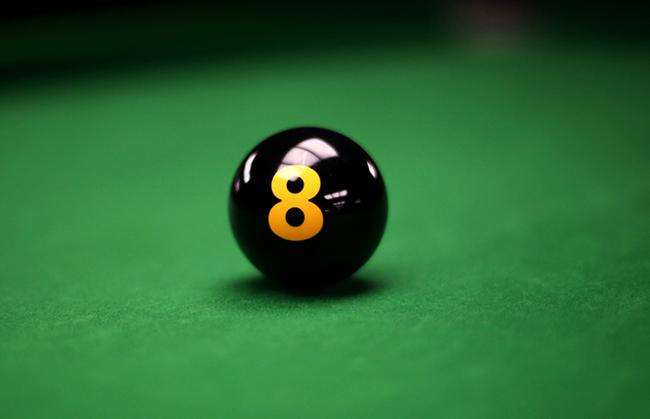(单词翻译:单击)
听力文本
Now, the VOA Learning English program Words and Their Stories.
On this program, we tell about expressions and how they are used in American English.
Preparing for this show is not always easy. Some expressions have complex roots. And Americans sometime use expressions in some situations, but not others.
Every week I write and produce a new show. My goal is to have everything ready by Thursday. So, if I don't have my report written by Wednesday, I really feel behind the eight ball.
In other words, I feel like I'm in a difficult situation. It will be hard to write the story, have an editor look at it and then produce it by Thursday night. I don't like to be behind the eight ball. Nobody does.

The expression "behind the eight ball" comes from the table game of pool.
As you might know, pool is played with sixteen small, hard balls. Fifteen of the balls are either solid colored or have stripes and they all have numbers. The other ball, known as the cue ball, is white. Players strike the cue ball with the end of a long piece of wood, called a cue stick. The aim is to shoot the numbered balls into one of six open pockets around the edge of the pool table.
You can play many different games on a pool table. One of them is called Eight Ball.
In Eight Ball, players try to put the numbered balls into the pockets, with the eight ball the last to go in. If a player sinks the eight ball before all the other balls leave the table, he or she loses.
You can put your opponent in a difficult position by leaving the cue ball behind the eight ball. The eight ball blocks your opponent.
So, if you are behind the eight ball, you are in a bad position. There is almost no way out.
Another expression from the world of games is nearly the same as being behind the eight ball. It is a sticky wicket.
A sticky wicket is a difficult or sensitive situation. This term comes from the sport of cricket. In the case of this expression, the "wicket" is part of the cricket field between the stumps – the poles or sticks stuck in the ground.
The grass on the wicket is usually shorter than other grass or there might not be any grass at all. So, weather conditions may affect this area and how the ball moves. If the wicket is too wet or too dry, the ball can move in an unpredictable way. This makes it difficult for the batter.
These days, cricket teams may use a cover for the wicket, but that hasn't affected the use of this expression. A sticky wicket is still pretty common in American English.
However, if you don't want to use these expressions from the pool hall or cricket field, you can simply use the words dilemma or predicament. They also mean a difficult situation.
Now, let's hear these expressions used in a couple of examples. First let's hear "sticky wicket."
What is wrong? You look terrible.
I have a really big problem.
Why don't you tell me about it? Maybe I can help.
All right. I took a co-worker to a friend's party over the weekend.
Okay...?
Well, I saw him take something from my friend's house without asking.
You mean, he stole something.
Yes. And now, I have to say something to my co-worker.
That really is a sticky wicket. I would not want to be in your position.
Next, let's hear the expression "behind the eight ball."
Hey! Can I borrow $500?
No! I don't have that kind of money on hand. Why do you need $500?
Well, I'm behind on my bills this month. See, I really like this girl. So, I've spent a lot of money on wining and dining her.
And you didn't think of how much all those meals and drinks would cost? You have really put yourself behind the eight ball!
And me? Well, I am no longer behind the eight ball. We have finished Words and Their Stories for this week. But there is always next week to worry about!
Practice using "behind the eight ball" or "sticky wicket" in a sentence, or let us know if your language has an expression that has the same meaning. You can do both in the Comments Section.
I'm Anna Matteo.
重点解析
1.solid colored 全身一色
However, it's very important for you to understand as a designer that there's absolutely nothing wrong with solid-colored white space.
但是,对于一个设计者必须要明白,纯色背景并没有任何不对的地方。
2.on hand 在手头;在近处;现有
There was simply no cash on hand to meet the cost of food.
手头实在没有现金可以购买食品。
3.be in a bad position 处境不利
I had never thought of anything but that I would reach the shore some way, and I would be in a bad position if I landed barefoot.
我当时总觉得我一定能上岸的,不管怎样上岸法。如果上岸时光着脚,那就糟了。
参考译文
这里是VOA学英语《词汇掌故》节目。
我们的节目探讨美式英语里的常用表达以及使用方法。
这个节目的准备工作不总是简单的。有些表达有着复杂的根源。而且,美国人有时在一些情景使用一个表达,但在另一些情境下并不使用。
每周我编写出新一期的节目。我的目标是在星期四的时候准备好一切事情。所以,如果我星期三还没写好,那我的境况真得岌岌可危(behind the eight ball)了。
也就是,我感觉我陷入了困境。写故事很难,编辑还要校对,星期四晚上才能出成品。我不喜欢岌岌可危(behind the eight ball)的感觉。没人会喜欢这种感觉。
“behind the eight ball”这个表达源自台球。
如你所知,台球有16个小硬球。其中15个球要么是纯色的,要么是带条纹的,且这15个球都是带数字的。剩下的那个球,被称作母球,是白色的。选手用一根被称作球杆(a cue stick)的长木头的末端击打母球。目标是把带数字的球击中进台球桌子周边的六个球袋(open pockets)中的其中一个。
你可以在台球桌上玩很多不同的打法。其中一种打法叫做“中式八球(Eight Ball)”。
中式八球,选手们需要努力将带数字的球打进球袋里,八号球则需要最后打进去。如果选手将八号球在其他球之前打进去球袋里,那么他或者她就输了。
你可以通过让母球留在八号球后面的方法让你的对手犯难。这样八号球难住了你的对手。
所以,如果你岌岌可危,那么你处境很不利。几乎无路可走。
另一个源自比赛界的表达几乎和“behind the eight ball(岌岌可危)”意思一样。这个表达就是“a sticky wicket(困境)”。
“a sticky wicket”是指困境或者敏感局面。这个短语出自板球运动(the sport of cricket)。这个表达里的“wicket”是指板球场上三柱门柱子之间的部分,柱子指的是插在地上的杆子或棍子。
柱子之间的草通常会比板球场其他地方的草短些,或者就没有草。所以,天气情况也许会影响这块区域以及球的运动轨迹。如果三柱门柱子之间的区域太潮湿或者太干,球可能会以不可预测的方式运动。这会使击球手(batter)很难击球。
现如今,板球队会用东西盖住柱子之间的区域,但这并不妨碍人们使用这个表达。“a sticky wicket”仍然在美语里很常见。
然而,如果你不想使用这些来自球桌或者板球场的表达,你可以就用单词“dilemma”或者“predicament”。它们也是表示困境。
现在,让我们来听听使用了这些表达的几个例子。首先,让我们听听“sticky wicket”的例子。
怎么了?你看起来很不好。
我有大麻烦了。
你为什么不和我说说呢?也许我可以帮上忙。
好吧。我周末带了一个同事去朋友的聚会。
好的······?
嗯,我看见他未经我朋友同意从我朋友家拿了一个东西。
你意思是,他偷东西了。
是的。现在,我得和我那同事谈谈。
那确实挺棘手的。我不想遇上你这样的情况。
接下来,让我们来听听“behind the eight ball”这个表达的例子。
嘿,我能借500美元吗?
不,我手头上没有那么多的钱。你为什么要500美元?
嗯,我这个月拖欠账单了。看,我真得很喜欢这女孩。所以,我请她吃饭花了不少钱。
你吃饭的时候不考虑会花多少钱?你还真是给自己找麻烦。
我的话?嗯,我再也不会让自己陷入窘境了。我们已经完成了这周的《词汇掌故》。但是,总有下一周的《词汇掌故》要去操心。
在句子中练习使用“behind the eight ball”或者“sticky wicket”吧。或者如果你的语言里有相同意思的表达,请告诉我们。以上这些你都可以在评论区告诉我们。
我是安娜·马特奥。


